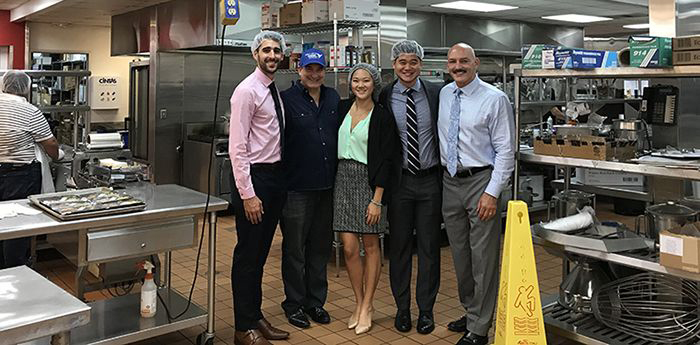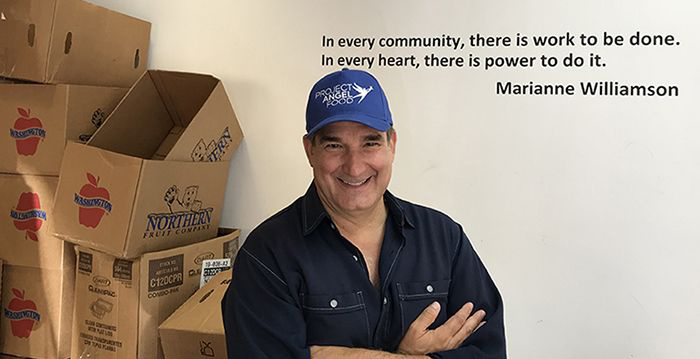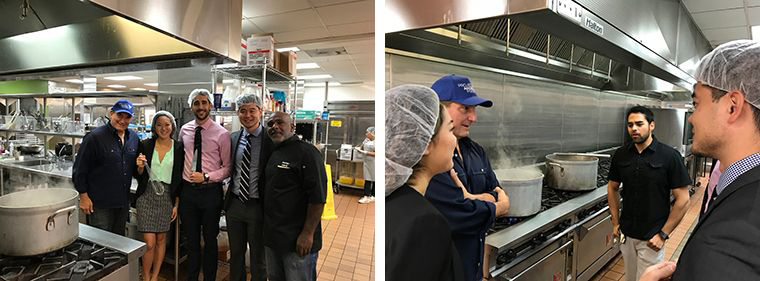
Graduate students at the USC Price School of Public Policy regularly get to utilize the skills they learn in class to do analysis for real-world clients during the course of their degree programs. This summer, three graduate students received the rare opportunity to complete a faculty instructor-led feasibility study for an important Los Angeles-based nonprofit as paid consultants.
USC Price’s Associate Dean of External Affairs John Sonego led a team of three graduate students – Master of Nonprofit Leadership and Management student Megan Ono, and Master of Public Administration students Edmundo Diaz and Shane Lee – in conducting a comprehensive feasibility study to assess the readiness of Project Angel Food for a capital fundraising campaign.
Project Angel Food (PAF), which is based in Hollywood, cooks and delivers more than 1,300 nutritious meals daily, free of charge, to the homes of men, women and children affected by life-threatening illnesses who are too sick to shop or cook for themselves.
Created in response to the HIV/AIDS epidemic, PAF is coming up on its 30th anniversary. The organization’s board of trustees is considering a capital campaign to update its Vine Street building, where its kitchen and administrative offices are housed, and pay off the building’s mortgage, with the thought that the $15,000 spent each month on the mortgage could go to expanding the operations to provide more meals.
The board took proposals for the project and opted to go with Sonego and the USC graduate students over professional consulting firms. With Sonego donating his time, the hourly pay for the graduate students was about one-third of the fees proposed by professional consulting firms.
Bobby Ralston, chair of the PAF Board of Directors, said it was an easy decision to use the Price graduate students and save money that could be used to provide meals. “We’re very happy with the results we got out of the project,” Ralston said. “We’re likely going to move forward with the capital campaign now based on their recommendation.”
Richard Ayoub, Project Angel Food’s executive director, added, “Megan, Edmundo and Shane helped Project Angel Food decide whether we should have a capital campaign at all and defined the direction for success. They came up with a comprehensive report and roadmap that will help us launch the campaign in 2019 in honor of our 30th Anniversary. On behalf of the 1,300 people who received meals from us today – we thank them!”

Project Angel Food Executive Director Richard Ayoub (Photo courtesy of John Sonego)
Turning ideas into impact
The idea to utilize Sonego and the Price student team for the project came from Sonego’s course “Fund Development for Nonprofit Organizations” (PPD 681). One of the class projects was a feasibility study for Hollywood Schoolhouse to assess its readiness for capital campaign. The head of the school, Ilise Faye, is also on the PAF Board. She was so impressed by the class project for Hollywood Schoolhouse that she recommended having Sonego oversee USC graduate students for their feasibility study.
“It was a great experience for the students because they got to see an organization with a very visible operation,” Sonego said. “They toured the kitchen, saw how meals are produced and also talked with people passionately committed to the organization to figure out what they needed to do to move forward.”
Ono worked on the Hollywood Schoolhouse project in Sonego’s class, and she identified two other graduate students she knew to work on the project. Being a student in the Master of Nonprofit Leadership and Management Program and having worked in the nonprofit field, Ono had a strong sense of what needed to be done.
“All of my classes are specifically tailored to the nonprofit sector, which was really valuable because I was able to contribute a lot from my coursework,” Ono said. “I had a board of governors class, so when making recommendations about the board I was able to bring those insights. Bringing in other students who are more interested in local government or policy change, all our unique specialties added up to a comprehensive and holistic set of recommendations.”
The team spent six weeks conducting interviews with staff, volunteers, board members and major donors, analyzing the giving history and net worth of donors, identifying new avenues of support, assessing the philanthropic landscape, and comparing similar capital campaigns to put together the proposal.
“In John’s class, I built a toolbox of resources and materials that I referred back to multiple times for the Project Angel Food project,” Ono said. “We used the same outline, script for interviews and team meeting agendas from class.”

Price students with Project Angel Food chefs and Executive Director Richard Ayoub (Photos courtesy of John Sonego)
Ongoing commitment
The USC Price team recommended that Project Angel Food pursue the project in phases, getting commitments from people to donate to the first phase before launching, and using the success of the first phase to generate more donations.
“Working with Project Angel Food, getting to know their stakeholders, staff and goals moving forward was definitely inspirational – the capacity that Project Angel Food has in tugging at the hearts of everyone involved,” Lee said. “It felt great being able to participate and help further the mission of an organization that does such great work in Los Angeles.”
Sonego, who has done these kinds of assessments before when working as a consultant, took a more hands-on approach than he does in his classes. He participated in all the project meetings and conference calls, providing guidance but also the freedom for the graduate students to explore new approaches.
Ono noted how insightful it was to observe “how John’s brain works, and seeing how he makes connections for creative fundraising or new goals they should go after. Because we were handpicked, I felt a greater pride and responsibility that he really believed in me to execute this project well.”
Sonego has committed to continue being involved with PAF going forward, and Ralston hopes that the students will stay involved as well.
“I don’t feel like they gave us the report and walked away,” Ralston said. “They let it be known that they are there as a resource if we need them.”
By Matthew Kredell
Students Gain Professional Insights, Experience Through Consulting Project for LA Nonprofit Project Angel Food was originally published on the University of Southern California website.